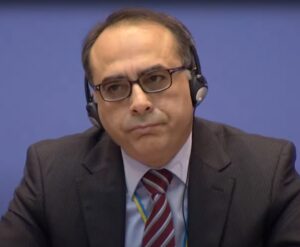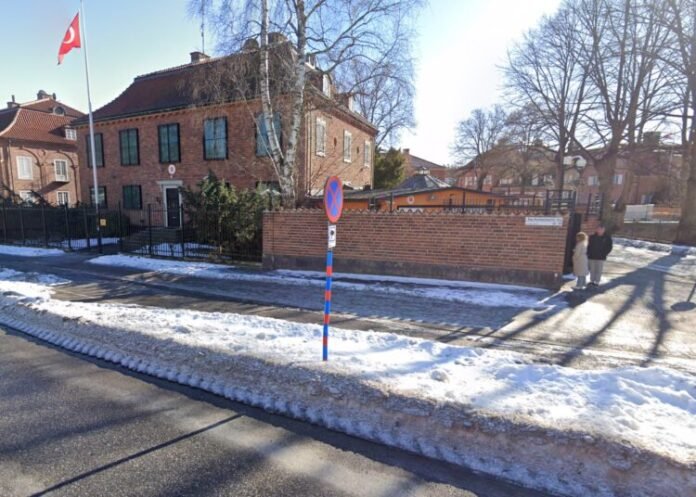Turkish intelligence services, operating from the embassy in Stockholm, have spied on journalists in Sweden, monitoring their activities and relaying information back to headquarters in Ankara, Nordic Monitor reported, citing an internal government communiqué that it obtained.
Dated January 18, 2024, the communiqué reveals the aggressive intelligence gathering operations on Swedish territory conducted by Turkish government agents. This heightened activity seemed to coincide with the prolonged delay in Sweden’s application to join NATO, which has been obstructed by Ankara for nearly two years.
The communiqué outlines a collaborative intelligence effort undertaken by multiple agencies focusing on the surveillance of journalists of Turkish origin residing in Sweden under political asylum protection. Among the listed targets are Nordic Monitor editors Abdullah Bozkurt and Levent Kenez, along with several others who have been under the scrutiny of President Recep Tayyip Erdogan’s government, which has gained notoriety for being among the worst jailers of journalists globally.
The communiqué refrains from explicitly specifying the origin of the intelligence, likely due to concerns about potential repercussions on Turkey-Sweden bilateral relations. However, the document’s format, wording and content, coupled with analogous leaked materials clearly implicating Turkish embassies and consulates worldwide, strongly suggest that the surveillance in Sweden was conducted by intelligence officers based at the Turkish Embassy in Stockholm.
The intelligence gathering activity appears to have been supervised by Turkish Ambassador Yönet Can Tezel, who had prior experience working for the Foreign Ministry’s intelligence unit, the Security and Research Directorate.
Tezel served in the intelligence unit from 2005 to 2014, initially as a counselor and later advancing to the position of deputy director of the section. Following this role, he was appointed as an ambassador. Recognized as a veteran within intelligence circles, Tezel’s career highlights his extensive experience and expertise in the field.
The intelligence collected on journalists was transmitted to this unit from the embassy in Stockholm and subsequently shared with other government agencies, including the National Intelligence Organization (MİT) and the Security General Directorate.
A document attached to the communiqué, also dated January 18, reveals that the Security General Directorate conducted additional research on the journalists, creating individual reports for each. These reports were subsequently shared with the Ankara Chief Public Prosecutor’s Office, where the journalists were already facing unfounded criminal charges.


The Erdoğan government frequently exploits the criminal justice system to penalize critical and independent journalists. This involves levying serious charges, such as terrorism, which carry heavier sentences. This pattern appears to be a deliberate intimidation campaign aimed at silencing journalists and suppressing freedom of the press and expression both in Turkey and abroad.
The Turkish government has previously targeted the Nordic Monitor news outlet and its editors. This has included blocking the site’s access within Turkey, initiating baseless criminal cases against both Bozkurt and Kenez and issuing arrest warrants for them.
Nordic Monitor, an investigative news website that was set up in 2019 by Bozkurt and Kenez, has also been brought up during talks between Turkish and Swedish delegations since Ankara demanded its closure. The confidential discussion about Nordic Monitor was revealed by Deputy Foreign Minister Burak Akçapar during deliberations at the Turkish Parliament’s Foreign Affairs Committee, which was tasked with reviewing Sweden’s NATO accession protocol on October 25, 2023.
“The Nordic Monitor issue is a serious matter. … Naturally, the closure of this is part of, and will continue to be part of, the negotiations we conduct with Sweden,” Akçapar informed lawmakers on November 16, 2023 while providing background information on the ongoing talks with the Swedish delegation to meet Ankara’s demands.
The disclosure led to the Swedish Union of Journalists (Journalistförbundet), a professional organization committed to advancing press freedom and safeguarding journalists’ rights in Sweden, issuing a statement on November 23, 2023. Ulrika Hyllert, the union’s president, said, “It is entirely unacceptable to demand that the media in Sweden cease their activities. The Turkish government’s assault on journalists and the media poses a threat to our freedom of expression.”
The following day, the European Federation of Journalists (EFJ) urged the Turkish government to retract its demand to close Nordic Monitor. “We believe that the Turkish government is applying pressure on its Swedish counterpart by requesting the country’s NATO delegations to close the website, whose articles are sometimes critical of the government of President Recep Tayyip Erdogan,” the EFJ said.
“The Turkish authorities are guilty here of filthy political blackmail in order to censor journalists who are simply doing their job,” said EFJ President Maja Sever. “The EFJ strongly condemns these mafia-like practices,” she added.

An alert was also issued on December 6, 2023 by the Platform for the Protection of Journalism and Safety of Journalists, a mechanism that was run by the Council of Europe in partnership with professional journalists organizations. The alert, filed by the EFJ, asked for the retraction of the demand by the Turkish authorities.
Under pressure from the United States, the Turkish Parliament eventually approved Sweden’s NATO membership protocol on January 23. However, it was a protracted process, taking 20 months to overcome Turkey’s objections. This extended period involved vigorous lobbying efforts by NATO allies and the secretary general of the military alliance, Jens Stoltenberg.
During the extended and contentious negotiations over Sweden’s NATO bid, Turkey had used it as leverage, effectively holding it hostagecommuniqué. During this period, Turkish intelligence services appear to have felt emboldened, intensifying their spying activities on Swedish territory. It seems they operated under the assumption that they could act with impunity as long as the negotiations continued. The intercepted communiqué and attached document serve as a clear manifestation of this audacious attempt by the Turkish authorities.
The foreign ministry’s intelligence section is currently overseen by Fatma Ceren Yazgan, a longtime operative of Turkish intelligence agency MİT who played a pivotal role in profiling Turkish ambassadors and diplomats, ultimately leading to the removal of one-third of Turkish diplomats from the foreign service in 2016. Hakan Fidan, the former head of MİT, appointed Yazgan to lead the section after assuming the role of foreign minister in the summer of 2023. Fidan also brought a number of senior intelligence officers from MİT and placed them in critical positions at the Foreign Ministry.
















